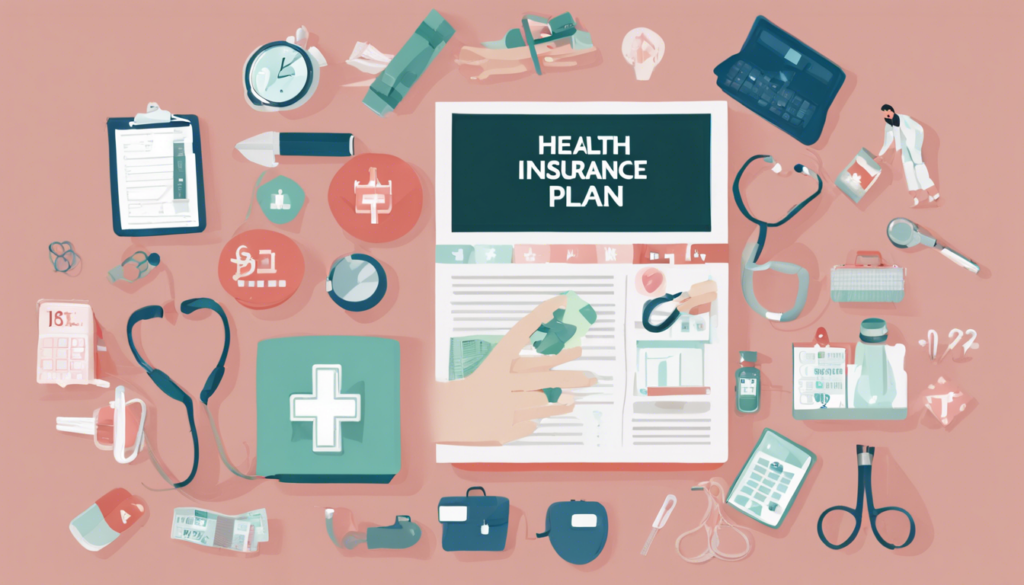Best Health Insurance Plan
Choosing the right health insurance plan can feel like navigating a maze. With so many selections and phrases to understand, it’s straightforward to get overwhelmed. But do not be involved—this data will break all of it down for you. By the finish, you’ll know exactly how to select the finest medical health insurance plan for your wants.
Understanding Health Insurance

What is Health Insurance?
Health insurance is a contract between you and an insurance coverage protection agency. You pay a premium and in return, the insurer helps cover your medical bills. It’s a strategy to shield yourself from extreme, stunning well-being care costs.
Types of Health Insurance Plans
There are quite a few types of health insurance plans, every with its personal private algorithm and safety selections. Understanding these may also help you make a knowledgeable choice.
Assessing Your Health Care Needs
Evaluating Your Health History
Look at your earlier medical and historical previous. How usually do you go to the doctor? Could you have any ongoing circumstances? This will assist you to resolve the degree of safety you need.
Family Health Needs
If you’re deciding on a plan for your family members, have in mind their well-being desires too. Are there any upcoming surgical procedures, ongoing therapies, or frequent doctor visits?
Frequency of Doctor Visits and Medications
How usually would you like medical care or prescriptions? Plans with greater premiums might lower costs for frequent visits and medicines.
Key Terms in Health Insurance
Premiums
This is the amount you pay month-to-month in your insurance coverage plan. It’s important to have funds for this widespread expense.
Deductibles
A deductible is what you pay out of pocket earlier than your insurance coverage begins overlaying costs. Plans with greater deductibles usually have decreased premiums.
Copayments and Coinsurance
A co-payment is a tough and quick amount you pay for a service like a doctor goes. Coinsurance is the share of costs you share along with your insurer after calculating your deductible.
Out-of-Pocket Maximums
This is the most you’ll pay in 12 months for lined firms. After reaching this amount, your insurance coverage covers 100% of your costs.
Types of Health Insurance Plans
Health Maintenance Organization (HMO)
HMOs require you to choose a significant care physician (PCP) and get referrals to see specialists. They generally have decreased premiums however they have much less flexibility.
Preferred Provider Organization (PPO)
PPOs present further flexibility, allowing you to see any doctor with no referral. But, they usually embrace larger premiums.
Exclusive Provider Organization (EPO)
EPOs are a mixture between HMOs and PPOs. They don’t require referrals; nonetheless, they prohibit safety to a group of medical doctors and hospitals.
Point of Service (POS)
POS plans to combine choices of HMOs and PPOs. You need a PCP and referrals for specialists; nonetheless, you’ll be able to see out-of-network suppliers at a greater value.
High-Deductible Health Plan (HDHP) with Health Savings Account (HSA)
HDHPs have extreme deductibles however lower premiums. They are generally paired with HSAs, which permit you to save pre-tax money for medical payments.
Comparing Health Insurance Plans
In-Network vs. Out-of-Network Providers
Check-in case your preferred medical doctors and hospitals are in-network. Out-of-network care is costlier and usually not lined up the least bit.
Coverage for Prescriptions
Ensure the plan covers your widespread prescriptions. Some plans have greater drug safety than others.
Specialist Care and Referrals
If you need specialist care, confirm if the plan requires referrals and the way it handles specialist visits.
Emergency and Urgent Care
Understand how emergency and urgent care are lined. Some plans have restrictions on out-of-network emergency services.
Understanding Coverage and Benefits

Essential Health Benefits
These are the minimally required benefits, along with outpatient care, emergency firms, hospitalization, maternity and new little one care, mental health services, prescription drugs, and more.
Preventive Services
Many plans cover preventive firms like vaccines and screenings at no additional value. Check which preventive firms are included.
Maternity and Newborn Care
If you’re planning to have children, make sure your plan covers maternity and new child care comprehensively.
Mental Health Services
Mental well-being is solely as important as bodily well-being. Ensure your plan covers psychological well-being firms, along with treatments and counseling.
Evaluating the Cost of Health Insurance
Balancing Premiums and Out-of-Pocket Costs
Finding the correct stability between premiums and out-of-pocket costs is significant. A plan with low premiums may have extreme out-of-pocket costs and vice versa.
Total Cost of Ownership
Consider the full value, along with premiums, deductibles, copayments, and coinsurance. Sometimes a greater premium plan can forestall money generally for those who occur to use an entire lot of firms.
Hidden Costs
Be aware of hidden costs, akin to out-of-network charges, safety limits, and exclusions.
Using Health Insurance Marketplaces
What Are Health Insurance Marketplaces?
Marketplaces are platforms where you’ll be able to consider and purchase medical health insurance plans. They may be state-run or federal.
How to Use Them
Enter your information to see their plans and consider their choices and costs. Marketplaces usually current subsidies for those who qualify, based on their earnings.
State vs. Federal Marketplaces
Some states have their very personal marketplaces, whereas others use the federal market at HealthCare.gov. Check which one your state makes use of.
Employer-Sponsored Health Insurance Plans
Understanding Employer Coverage
Many employers present medical health insurance for revenue. These plans may be cost-effective since employers usually share the value of premiums.
Benefits and Drawbacks
Employer plans may have restricted selections in distinction to the market. But, they are going to present consolation and reduce costs.
Open Enrollment Periods
Pay consideration to open enrollment durations when chances are you’ll be part of or change your medical health insurance plan using your employer.
Government Programs and Assistance
Medicaid
Medicaid provides well-being safety for low-income folks and households. Eligibility and benefits fluctuate by state.
Medicare
Medicare is for people aged 65 and older or with certain disabilities. It has completely different elements overlaying hospital care, medical firms, and prescription drugs.
CHIP
The Children’s Health Insurance Program (CHIP) covers children in low-income households who don’t qualify for Medicaid.
Subsidies and Tax Credits
If you buy insurance coverage via the market, chances are you’ll qualify for subsidies or tax credits to cut back your premiums based on your earnings.
Special Considerations
Health Insurance for Self-Employed Individuals
Self-employed people can purchase insurance coverage via the market. Some might qualify for subsidies based mostly totally on their earnings.
Short-Term Health Insurance Plans
Short-term plans present momentary safety. They are a lot much less full and should not cover pre-existing circumstances; nonetheless, they’re often a stop-gap decision.
International Health Insurance
If you journey ceaselessly or dwell abroad, have in mind worldwide medical health insurance to be sure you’re coated worldwide.
Tips for Choosing the Best Health Insurance Plan
Prioritize Your Needs
List your well-being care priorities and wishes. This will assist you in choosing a plan that covers what’s most important to you.
Read the Fine Print
Understand what every plan covers and excludes. Don’t overlook the particulars that might affect your safety.
Seek Professional Advice
Consider talking to an insurance coverage supplier or advisor. They may assist you in navigating your selections and uncover the finest plan.
Common Mistakes to Avoid
Ignoring the Details
Don’t skip the optimistic print. Small particulars can have a giant impact on your safety and costs.
Choosing Based on Price Alone
Cheaper isn’t all the time greater. Look at the basic value of the plan, along with safety and out-of-pocket costs.
Not Considering Future Needs
Think about what your future well-being desires. A plan that works now will not be acceptable in the occasion that your state of affairs modifications.
Conclusion

Choosing the finest medical well-being insurance plan requires cautious consideration of your well-being, an understanding of key phrases, and the comparability of varied plans. By prioritizing your desires and doing a radical evaluation, you possibly can discover a plan that gives the biggest safety at a manageable value. Remember, a correct medical well-being insurance plan you peace of mind and protects you financially.
FAQs
What is the finest medical medical insurance plan for households?
The biggest plan for households generally balances premiums with complete safety for pediatric care, preventive firms, and family doctor visits. HMOs or PPOs usually present good family safety.
How do I know if my doctor is in-network?
Check your insurance coverage plan’s provider itemizing or title your doctor’s office to verify in the occasion that they settle to your insurance coverage protection.
Can I modify medical medical insurance plans mid-year?
You can usually solely change plans all through the open enrollment interval till you qualify for a selected enrollment interval due to life occasions like marriage or job loss.
What happens if I miss the open enrollment interval?
If you miss open enrollment, chances are you’ll want to wait till the subsequent interval till you qualify for a selected enrollment interval. Short-term plans are often momentary resolutions.
How does a well-being monetary financial savings account (HSA) work?
An HSA is paired with a high-deductible well-being plan. It permits you to save pre-tax money for medical payments. Funds roll over yearly and may be invested.

